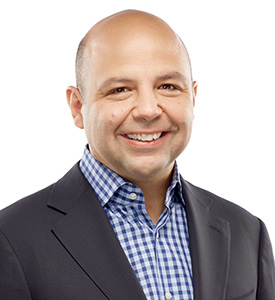It's a question of integrity
Cell repair: Understanding the body's response to DNA mutations

Photo credit: Matthew Plexman Photography
CIHR Foundation Grant Recipient
Dr. Daniel Durocher
Senior Investigator
Samuel Lunenfeld Research Institute
Mount Sinai Hospital (Toronto)
Professor of Molecular Genetics
Faculty of Medicine
University of Toronto
Dr. Durocher's Research
Imagine brilliant, high-performance systems running regular, comprehensive self-diagnostic scans to identify problems, detect faults, automatically schedule pit stops and perform full service repairs. Complex and superbly talented, they ride on a state-of-the-art, robust platform that is built to last.
Want to own one? You already do – it's the human body!
The master mechanics of this system are DNA repair mechanisms. They keep our cells in top shape and lesion free. It's a big job and the pressure is constant, considering that we are bombarded by DNA damaging threats, like environmental pollutants, on a constant basis.
Driving advances in the understanding of how our cells repair their DNA is Dr. Daniel Durocher, a Senior Investigator with the Samuel Lunenfeld Research Institute at Toronto's Mount Sinai Hospital, and a Professor of Molecular Genetics with the University of Toronto's Faculty of Medicine. Through his research, we are learning that alterations in the activity of one protein, a lone amino acid change, may be the trigger of a DNA mutation.
Life, in all of its various forms, depends on sophisticated structures being developed gradually by cells to decode, replicate, and segregate the information stored within chromosomes. Normal cellular processes, like division, can damage our DNA, which, if not accurately mended, can permanently alter the messages encoded by our genes.
A chromosome is the DNA molecule which is contained in each cell's nucleus, packaged into thread-like components. Each chromosome is made up of DNA that has been tightly coiled many times around proteins called histones that support its structure. Over time, a cell's genome, which is a complete set of genes contained within the cell, is inevitably altered.
Maintenance and preservation of genome stability is reliant on the ability to repair DNA double-strand breaks (DSBs) within cells. The causes of DSBs can be environmental, such as exposure to radiation, chemicals or due to errors in the cells.
Thankfully, DSB are a rare event and fractured DNA has the remarkable ability to self-heal and revert back to its original form, due to very sophisticated machinery that is studied by Dr. Durocher.
Supporting advances in the genetics of the DNA repair response
With his Foundation grant, Dr. Durocher is gaining valuable insight into the molecular machinations of our bodies, focusing his research on how cells signal and then repair DSBs.
The team at Durocher Lab is exploring exactly how our bodies have developed this fascinating system of checks and balances, including key transition points that regulate progression to the next stage of the cell cycle, inspecting the genome for damage, before the process proceeds to the next phase in the reproductive cycle. Many diseases, including the full spectrum of cancers, are triggered when issues arise in the normal cellular process. Mutations in genes involved in the DNA damage-response frequently contribute to other problems including infertility and immune deficiency. Targeting the proteins that regulate DNA repair could lead to new types of therapeutics for these diseases.
About Dr. Durocher
As a child, Daniel Durocher dreamed of becoming an astronomer. It was while pursuing undergraduate work at the University of Montreal, that he was exposed to gene transcription. He had found his calling: Health Science. Dr. Durocher went on to earn his doctorate at McGill University in 1998 and completed post-doctoral research at Cambridge University. He has won numerous awards, including Canada's Top 40 Under 40 by Caldwell Partnersin 2010, and received the prestigious 2015 Paul Marks Prize for cancer research from Memorial Sloan Kettering in New York City.
A generous mentor to junior faculty and scientific trainees, Dr. Durocher remains on the cutting edge of advances in genome stability research.
"We see ourselves as the intelligence service in the fight against cancer: we gather critical information on the basic biological pathways that are involved in cancer formation as a means to one day develop more efficacious therapies"
- Date modified: